ISLAMABAD: An accountability court judge said on Sunday he had ruled in a corruption case against former Prime Minister Nawaz Sharif on the “basis of evidence,” rejecting accusations by the daughter of the jailed leader that her father was wrongfully convicted because the judge was “blackmailed” into issuing a wrongful verdict.
At a press conference flanked by senior leaders of the Sharif’s Pakistan Muslim League-Nawaz (PMLN) party on Saturday, Maryam Nawaz Sharif said accountability judge Arshad Malik had confessed during a meeting with PMLN leader Nasir Butt that he was forced to issue an “unjust” verdict against Sharif by ‘people’ who blackmailed him with a “personal video.” The video of Malik’s conversation with Butt was ostensibly filmed in secret, without his permission.
Sharif was sentenced to seven years in prison and fined $25 million on corruption charges by Judge Malik in December last year who ruled that the three-time prime minister was unable to prove the source of income that had led to his ownership of a steel mill in Saudi Arabia. Under Pakistani law, this is taken to prove corruption. On the same day, Malik acquitted Sharif in a second case relating to Flagship Investments, a company established by his son, Hasan Nawaz, that owns luxury properties in Britain.
“If I had to bow to pressure or any material greed, I would not have exonerated [Nawaz Sharif] in one case and handed down punishment in another one,” Malik said in a press statement on Sunday. “I want to clarify it there was neither any direct or indirect pressure on me nor was there any greed. I decided all these cases on the basis of evidence.”
He added that representatives of the Sharif family had offered him bribes repeatedly to rule in the former prime minister’s favor and also threatened him: “I decided to stay firm … entrusted my life and wealth to Allah,” Malik said.
He said the video shown in Maryam’s presser was “fake and concocted,” urging legal action against those involved in making it.
Describing the clip as “divine help” for her family, Maryam had described during her press conference that the judge could be heard in the video highlighting several flaws in his own verdict that he wanted Nasir Butt to convey to the Sharif family lawyers to help him get an acquittal verdict in appeal hearings.
Sharif has always termed the charges against him politically motivated and accused the military and courts of working together to end his political career and destabilize the PMLN party. Both deny the charge.
PMLN spokesperson Marrium Aurangzeb rejected Malik’s accusations that he was offered bribes or threatened by Sharif family representatives, and said if there was pressure on the judge, he should have come forward earlier while the cases were being heard.
“If there was pressure on him, he should have told Supreme Court ... that Sharif family representatives had offered him a bribe,” she told Arab News on Sunday.
A day earlier, Pakistan’s de facto information minister, Firdous Ashiq Awan, had condemned the allegations against the accountability judge and said the PML-N had maligned the judiciary. She said a forensic audit of the video would be conducted, adding that it was important to ascertain if the contents of the video were “real or tampered.”
Pakistan’s Electronic Media regulatory Authority (PEMRA) has also sent a notice to several private news channels over the live broadcast of Maryam’s press conference, calling it “in violation of PEMRA laws and code of conduct.”
On Sunday, opposition leader and chairman of the Pakistan People’s Party, Bilawal Bhutto, expressed “grave concern” over Maryam’s allegations and called upon the superior judiciary to take appropriate action.
“If for some reason the judiciary is not inclined to address such issues then the opposition parties must deliberate on it and formulate a united course of action,” Bilawal’s spokesperson senator Mustafa Nawaz Khokhar said.
Politics professor Dr. Rasul Bakhsh Rais said if the video was indeed genuine, then “the burden of proof is on the honorable judge to prove he was blackmailed.”
“Ethically, professionally and legally, a judge, such as him, is wrong and guilty of miscarriage of justice if he admits that he has given a verdict under pressure,” Rais said. “I think the judge has been drafted into playing politics in support of the Sharif family. He had an option to recuse himself from the case if he felt someone was placing him under pressure.”
Pakistani judge rejects accusations he ruled against ex-PM Sharif under duress
Pakistani judge rejects accusations he ruled against ex-PM Sharif under duress

- Says decided all cases “on the basis of evidence” despite being offered bribes and threatened by Sharifs
- Sharif’s daughter held a press conference on Saturday, showed a secretly-filmed video of the judge admitting he wrote verdicts under pressure
Pakistan refiners warn $6 bln upgrades at risk due to fuel price deregulation plan
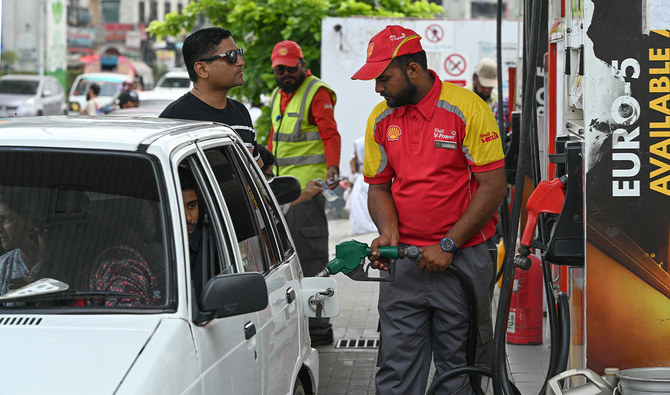
- Regulatory authority proposes oil marketers, refineries be allowed to set prices instead of government
- Refiners demand they be consulted before the implementation of “irrational recommendations”
KARACHI: Pakistan’s plans to deregulate fuel prices could lead refiners to halt planned upgrades worth up to $6 billion and force some refineries to close, some of the country’s top refiners said in a letter to the country’s oil regulator.
Looking to drive down prices for consumers, the South Asian nation’s Oil & Gas Regulatory Authority (OGRA) has proposed that oil marketers and refineries be allowed to set fuel prices, instead of the government setting prices.
As part of the change, OGRA proposed scrapping or reviewing a rule that requires fuel buyers to purchase supply from local refineries, another issue the refiners said could result in “disastrous consequences.”
The refiners — state-run Pakistan Refinery and private domestic refiners Pak Arab Refinery, Attock Refinery, Cinergyco, and National Refinery — said they were already struggling to operate near full capacity and asked that they be consulted before the implementation of “irrational recommendations.”
“The refining sector requires OGRA support through pragmatic and supportive measures, rather than suggesting ways that if implemented would result in their permanent closure,” the refiners told OGRA on Monday in a letter, which was reviewed by Reuters.
The deregulation was aimed at boosting competition and protecting the public interest, OGRA told Reuters in a statement on Tuesday, but did not respond to specific questions on the letter from the refiners. However, it said in an April 17 presentation reviewed by Reuters the potential impact of deregulation on refinery upgrades had to be assessed carefully, calling it a challenge.
“The refineries upgradation will bring in investment of $5 — 6 billion and not only result in cleaner environment friendly fuels but also result in savings of precious foreign exchange of the country,” the refiners wrote in the letter to OGRA.
Pakistan hopes to get new IMF loan by early July, says finance minister
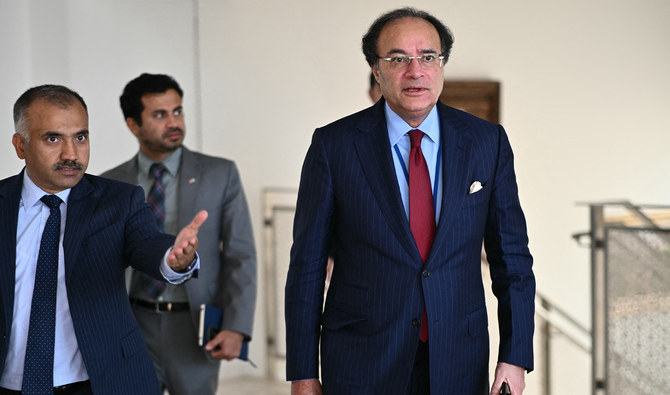
- Pakistan’s current $3 billion financial arrangement with IMF expires in late April
- Islamabad is seeking “bigger,” long-term loan to ensure macroeconomic stability
Pakistan is hoping to reach a staff-level agreement with the International Monetary Fund by June or early July, its finance minister said on Tuesday.
The country’s current $3 billion arrangement with the fund runs out in late-April, which it secured last summer to avert a sovereign default.
Islamabad is seeking a long-term bigger loan to help bring permanence to macroeconomic stability as well as an umbrella under which the country can execute structural reforms.
“We are still hoping that we get a staff-level agreement by June or early July,” Finance Minister Muhammad Aurangzeb told a conference in Islamabad.
He returned from Washington last week after leading a team to attend the IMF and World Bank’s spring meetings. “We had very good discussions in Washington,” he said.
He said he did not know at this stage the volume and tenure of the longer program.
Pakistan ‘rarely’ punished officials for rights abuses in 2023— State Department report
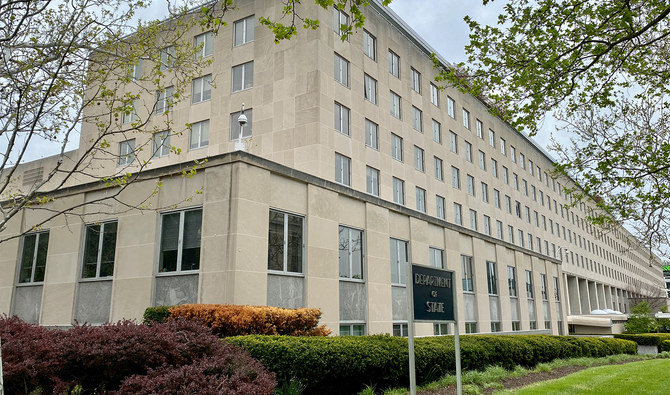
- US State Department releases annual “Country Reports on Human Rights Practices” for the year 2023
- Report says Pakistan witnessed extrajudicial killings, torture and restrictions on media freedoms last year
ISLAMABAD: Pakistan’s government “rarely” took steps to identify and punish officials who may have been involved in rights abuses in 2023, a report released by the US State Department said on Tuesday, pointing out incidents of extrajudicial killings, torture, enforced disappearances, violence against journalists and restrictions on media freedom had taken place in the country last year.
US Department of State released its annual “Country Reports on Human Rights Practices” to highlight rights issues in several countries, including Pakistan. In the report, Washington identified that Pakistan last year witnessed arbitrary killings, extrajudicial killings, enforced disappearance, torture and “cases of cruel, inhuman, or degrading treatment or punishment by the government or its agents.”
“The government rarely took credible steps to identify and punish officials who may have committed human rights abuses,” the report said.
Cases of “enforced disappearances” of citizens have long plagued Pakistan, where militants have waged a war against the state for decades. Families say people picked up by security forces often disappear for years, and are sometimes found dead, with no official explanation. Pakistani security agencies deny involvement in such disappearances.
The report also pointed out that last year Pakistan had seen incidents of restrictions on freedom of expression and media freedom, violence against journalists, unjustified arrests, disappearances of journalists, censorship and criminal defamation laws.
Pakistan’s recent actions to restrict Internet and mobile services throughout the country, especially on days when elections are held, have invited criticism from rights organizations and Washington. The interior ministry last week confirmed it had banned social media platform X in February to protect national security, maintain public order, and preserve the country’s “integrity.”
The State Department report further pointed out that rights issues in Pakistan during 2023 included extensive gender-based violence, including domestic or intimate partner violence, sexual violence, early, child and forced marriages. It said Pakistan had also reported incidents of female genital mutilation and crimes involving violence or threats of violence targeting members of religious, racial and ethnic minorities.
The report added that violence, abuse and social and religious intolerance by militant organizations and other non-state actors, both local and foreign, contributed to a culture of lawlessness in the country.
“Terrorist and cross-border militant attacks against civilians, soldiers, and police caused hundreds of casualties,” the report noted, crediting Pakistan’s military, police and other law enforcement agencies for carrying out “significant campaigns” against militants last year.
The South Asian country has seen an uptick in violence, mainly suicide attacks, since November 2022 when a fragile truce between militants and the state broke down. Pakistan has since then carried out military operations against the Pakistani Taliban or the Tehreek-e-Taliban Pakistan (TTP) and a Baloch separatist militant organization, the Balochistan Liberation Army (BLA) in the country’s two western provinces that border Afghanistan.
Iranian president in Lahore on second day of official visit to Pakistan
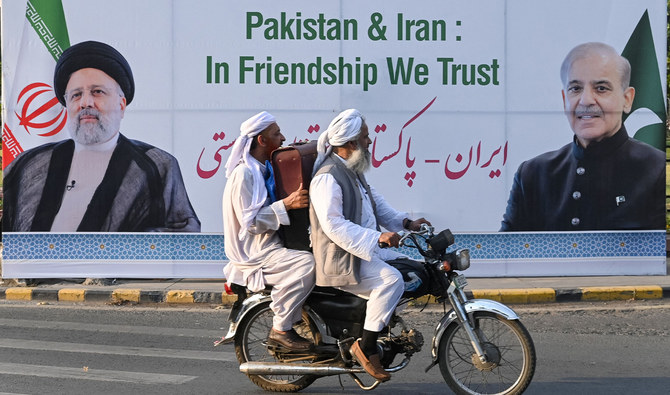
- On Monday, Islamabad and Tehran signed eight accords including on trade, technology, health, culture, information
- Interior ministers of Pakistan and Iran agree on joint action plan to deal with terrorism, smuggling, drug trafficking
ISLAMABAD: Iranian President Ebrahim Raisi arrived in Lahore on Tuesday on the second day of a three-day visit to Pakistan where he will meet top government officials and business leaders before traveling to the country’s commercial hub, Karachi.
Raisi arrived in Islamabad on Monday on a three-day visit as the two Muslim neighbors seek to mend ties after unprecedented tit-for-tat military strikes earlier this year. The Iranian official’s visit is the first by any head of state to Pakistan after the South Asian nation’s February general elections and the formation of a new government headed by Prime Minister Shehbaz Sharif. The visit also comes as tensions are high in the Middle East after Iran launched airstrikes on Israel a week ago and Israel retaliated with its own attack on Friday.
“Iranian President Syed Ibrahim Raisi has reached Lahore,” state television PTV reported, where he was received by Punjab Chief Minister Maryam Nawaz.
The Iranian president began his Lahore trip by visiting the mausoleum of Allama Muhammad Iqbal, Pakistan’s national poet, whose literary works in the Persian language have garnered him wide recognition in Iran.
After meetings in Lahore, Raisi will travel to Karachi, where he will hold meetings with the provincial leadership and be awarded an honorary doctorate by the University of Karachi, state-run Radio Pakistan reported.
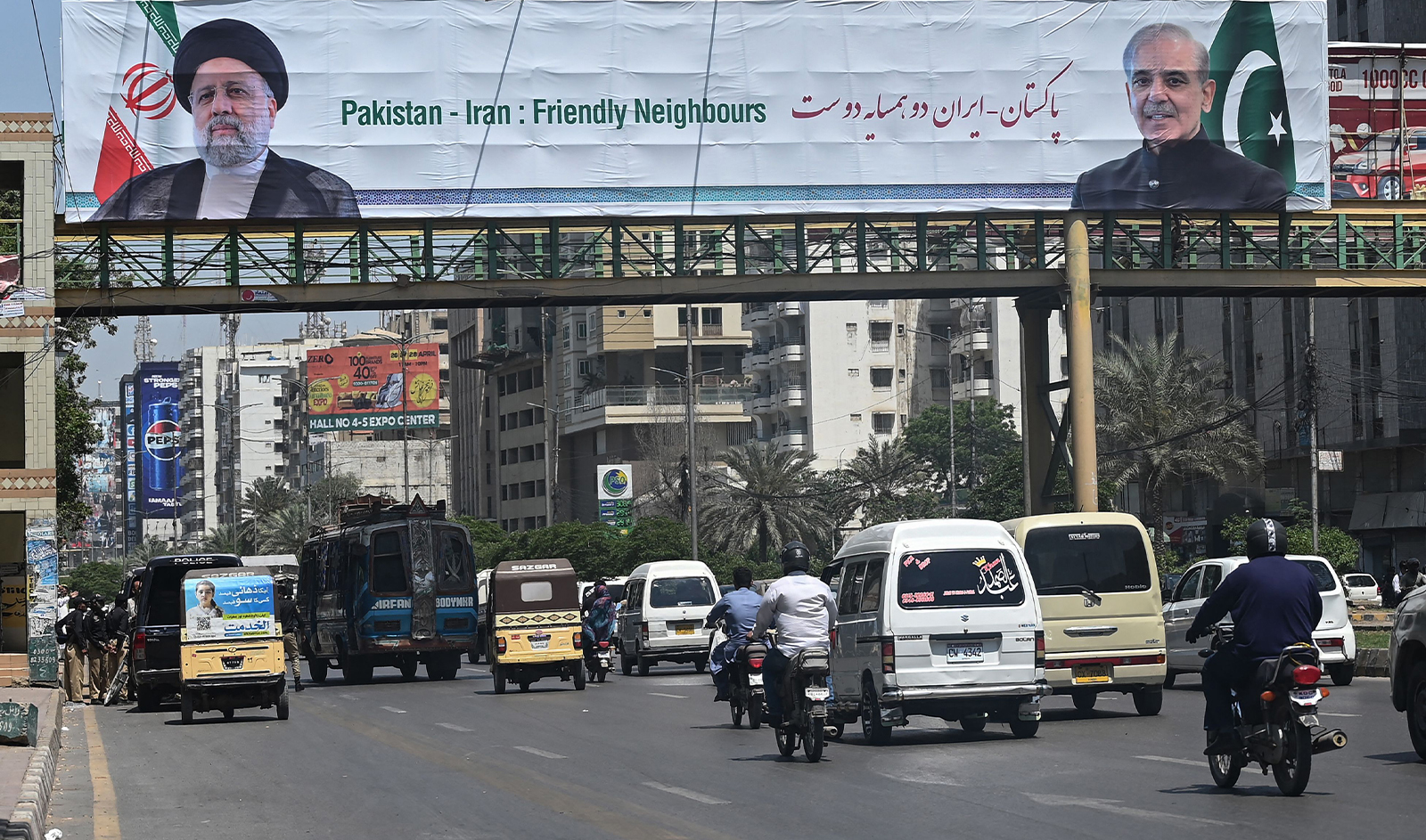
On Monday, Raisi held delegation-level meetings in the Pakistani capital as well as one-on-one discussions with the prime minister, president, army chief, chairman senate and speaker national assembly.
He also witnessed the signing of eight MoUs and agreements covering different fields including trade, science technology, agriculture, health, culture, and judicial matters. These include an MoU on the establishment of the Rimdan-Gabd Joint Free/Special Zone; on cooperation between the Ministry of Cooperative Labour and Social Welfare of Iran and the Ministry of Overseas Pakistani and Human Resources Development of Pakistan; on judicial assistance and legal cooperation at the ministry levels; on cooperation for animal hygiene and health; on mutual recognition in the field of quarantine and phytosanitary; and on the promotion of culture and films.
“The economic and trade volume between Iran and Pakistan is not acceptable at all and we have decided at the first step to increase the trade volume between our two countries to $10 billion,” Raisi said at a joint press conference with Sharif.
The interior ministers of Pakistan and Iran also met on Monday and discussed border management to prevent smuggling and drugs trafficking, and “decided in principle to ban terrorist organizations in their respective countries,” state news wire APP said.
“The two sides agreed on a joint plan of action to deal with the menace of terrorism being a common problem, with further improving mutual support and exchange of intelligence information.”
A security agreement regarding this decision would be signed “at the earliest,” APP added.
Pakistan and Iran have had a history of rocky relations despite a number of commercial pacts, with Islamabad being historically closer to Saudi Arabia and the United States.
Their highest profile agreement is a stalled gas supply deal signed in 2010 to build a pipeline from Iran’s South Fars gas field to Pakistan’s southern provinces of Balochistan and Sindh.
Pakistan and Iran are also often at odds over instability on their shared porous border, with both countries routinely trading blame for not rooting out militancy.
Tensions surged in January when Pakistan and Iran exchanged airstrikes, both claiming to target alleged militant hideouts in each other’s countries. Both sides have since then undertaken peace overtures and restored bilateral ties.
Pakistani, UAE officials perform groundbreaking of bulk and general cargo terminal in Karachi
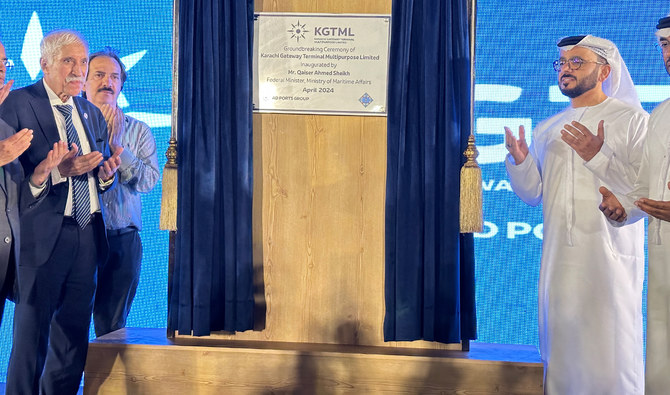
- Pakistan’s maritime affairs minister says UAE’s investment an important “breakthrough” that has increased interest of other players
- Multi-purpose terminal will handle grains, fertilizers and other kinds of export and import, says official of company operating terminal
KARACHI: Pakistani and United Arab Emirates (UAE) officials performed the groundbreaking of a $175 million Bulk and General Cargo terminal on Monday, describing it as an “important breakthrough” for the South Asian country in the maritime sector.
Under a government-to-government (G2G) agreement between Pakistan and the UAE earlier this year, a new 25-year concession agreement was signed between AD Ports Group and Karachi Port Trust (KPT) in Feb. 2024 to outsource operations of the bulk and general cargo terminal.
Under the terms of the agreement, Karachi Gateway Terminal Multipurpose Limited (KGTML), a joint venture between AD Ports Group, as a majority shareholder, and Kaheel Terminals, a UAE-based company, will develop, operate and manage the Bulk and General Cargo Terminal, berths 11 to 17 at Karachi Port’s East Wharf. The move is expected to enhance Karachi’s position as a key player in the maritime industry.
Qaiser Ahmed Sheikh, Pakistan’s minister of maritime affairs, unveiled the KGTML plaque at Karachi Port on Monday, describing the UAE’s investment as a “very important breakthrough” which has increased the interest of other players in the maritime sector.
“This investment from Abu Dhabi Ports is very important for Pakistan, it is a breakthrough,” Sheikh told Arab News at the sidelines of the event. “It is the first investment in terminal and following this, there are many other companies who are also interested in Pakistan.”
The minister shared that Maersk Line, the largest owner and operator of US flag vessels, has also expressed interest in investing in Pakistan.
“We are looking forward to investment from other companies like, you see, other shipping lines,” Sheikh said. “We are having a meeting (on Apr. 25) with Maersk Line and we are also expecting (investment).”
Khurram Aziz Khan, KGTL’s chief executive officer, said AD Ports plans to invest about $157 million for the bulk terminal’s development, adding that it would handle all kinds of bulk cargo.
“This is basically a multi-purpose terminal which will not only handle grains but also fertilizers and other kinds of export and import, dirty or clean cargo as well,” Khan told Arab News.
“We are making a long-term investment to make it a regional hub not only for containers but also for the multi-purpose facilities,” Khan explained, adding that the project, once completed, will also save the time and cost of doing business.
He informed that AD Ports has an overall plan of investing about $395 million in the development of the container and cargo terminal.
“We have an overall plan of $220 million investment in the container terminal and $175 million of investment in the multi-purpose bulk terminal,” the KGTL chief said.
AD Ports Group also presented Sheikh a cheque for the upfront fee payment amounting to $50 million payable to KPT as per the terms outlined in the Agreement for Outsourcing of Operations of Bulk and General Cargo Terminal.
Abdul Aziz Baloshi, chief executive officer of Fujairah Terminals, AD Ports Group, said the group was expanding its operations in Pakistan.
“Progress will be made through investment in the supply chain,” Baloshi said at the event. “Karachi port is the future of Pakistan and Pakistan is included in our priority list in the region.”
UAE’s Consul General Bakheet Atiq Al-Remeithi said Emirati investors are interested in investing on a large scale in Pakistan. He said their areas of interest included ports and shipping, railways, and other infrastructure.
“Apart from port investments, investments will be made in railway infrastructure, export zones, and other sectors,” Al-Remeithi shared.
The port operator hoped that the facilities will help Pakistan become the regional hub for handling export and import of cargoes from Central Asian countries.
The agreement for the construction of the Bulk and General Cargo terminal at the Karachi port was based on the concession agreement secured by AD Ports Group to develop, operate and manage container terminal at berths 6-10 at Karachi port’s East Wharf in June 2023.
AD Ports Group had signed a 50-year concession agreement with KPT to secure the terminal’s operations.











